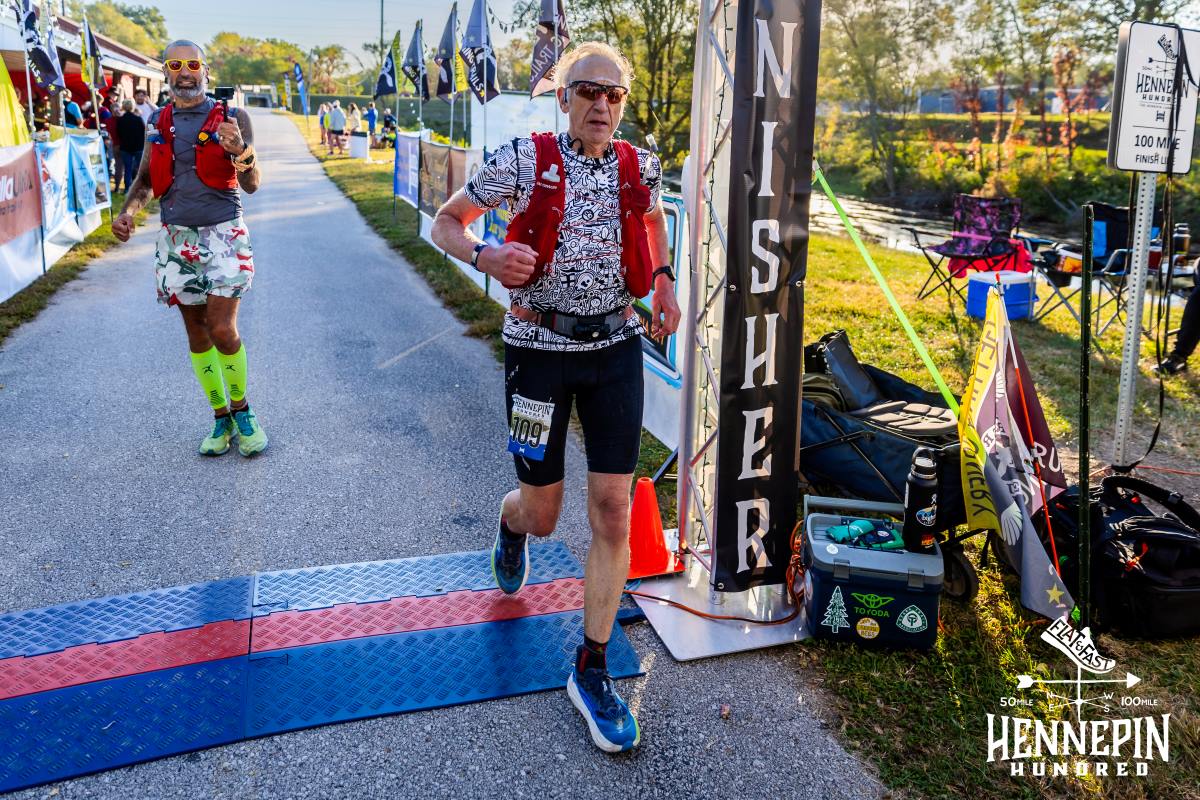 Earlier this month at the Hennepin 100 Mile in Illinois, 70-year-old ultrarunner Henry Bickerstaff from Alva, Oklahoma, ran the fastest 100-mile trail race for a 70-plus-year-old runner in North America this year. Henry’s time of 25:12 was achieved through a combination of carefully designed training, perfect race-day execution, and an optimistic mindset.
Earlier this month at the Hennepin 100 Mile in Illinois, 70-year-old ultrarunner Henry Bickerstaff from Alva, Oklahoma, ran the fastest 100-mile trail race for a 70-plus-year-old runner in North America this year. Henry’s time of 25:12 was achieved through a combination of carefully designed training, perfect race-day execution, and an optimistic mindset.
In the fall of 2016, Henry was following the training methodology from Joe Friel’s book “Fast After 50.” While he was seeing some progress, he felt he was not running to his potential. After finishing Western States 100 in 2010, Henry had gone on a rough streak of not finishing 100 milers for six years. He knew he needed to do something different. On the advice of his friend and Western States 100 champion, Kaci Licktieg, he reached out to me.
Our personalities immediately meshed. I am not a cheerleader-type coach, and Henry is definitely not an athlete who needs a cheerleader. A typically stoic U.S. Midwestern accountant, Henry doesn’t need someone to hold his hand. Rather, he needs a coach who will plan his training, hold him accountable, and offer both encouragement and constructive criticism.
Back in January, we mapped out a detailed plan that would culminate at the Hennepin 100 Mile in October. Henry wanted to gain another Western States 100 qualifier, and also build up to his best fitness level to date. We decided to focus his most intense workouts on the bike, which he would ride twice a week. On the other five days of the week, Henry ran a mix of recovery runs, endurance runs, and interval workouts.
In the nine-month build up to the Hennepin 100 Mile, Henry averaged just over 10 hours of training per week, while expanding his aerobic base and remaining injury free.
As with any older athlete, recovery between hard or long efforts proved to be the biggest challenge. Through the spring and summer, we constantly tweaked Henry’s training to make sure he was suitably recovered in time for his next big dose of training. By the time August rolled around, we had found the sweet spot between intensity and recovery, and Henry was ready for the most important part of his entire build up — his three-day training camp.
Having worked with Henry for so long, I knew he was well equipped to handle the demands of a three-day camp. And, I also knew that Henry liked to integrate a race into his three-day training camp, as a way of anchoring the training in something tangible. Henry chose the Iron Will 50 Mile race as his training camp race, since the course was similar to the Hennepin 100 Mile, and it takes place five weeks ahead of race day.
Henry ran 25 miles on the Thursday before the Iron Will 50 Mile and 15 miles on Friday to give him a nice 90-mile camp. Even on tired legs, he managed to run an impressive 10:09 at the race, which up until now is the fastest 50-mile trail run for a 70-plus-year old male in North America in 2024. At that point, we both knew he was ready and primed for a great race.
Ultrarunning coach Jason Koop likes to say that the best executed races are actually boring. Henry nailed this at the Hennepin 100 Mile. With the exception of a few hours of stomach distress in the heat of the day, Henry maintained his energy levels throughout the race, took care of himself both physically and mentally, and paced the race brilliantly. So brilliantly, in fact, that over the last 40 miles of the race he passed 41 people, more than one person per mile, something of which he was particularly proud.
In my follow-up conversation with Henry, I asked him what his key takeaway from his performance was. His answer was great: “My takeaway is that anything is possible with proper physical and mental training. I think the key to my success is the understanding that training evolves as you age, and that at 70, or even 60 or 50, we cannot train the same as we did when we were 20, 30, or even 40. What becomes more important is consistency and paying more attention to the little things.”
Henry Bickerstaff’s Beer of the Week
 This week’s beer, as selected by Henry, comes from Alva Beer Company in Alva, Oklahoma, a small brewpub-style venue serving delicious beers and artisan pizzas. Pax Americana West Coast IPA takes inspiration from the lighter and more approachable version of the style, bringing all of the hop aroma and flavor with a much less pronounced bitterness. The end result is a dangerously drinkable IPA, which measures up at 7.1% ABV. Most drinkers will enjoy its beautifully creamy head, and crystal-clear, orange-to-reddish hue.
This week’s beer, as selected by Henry, comes from Alva Beer Company in Alva, Oklahoma, a small brewpub-style venue serving delicious beers and artisan pizzas. Pax Americana West Coast IPA takes inspiration from the lighter and more approachable version of the style, bringing all of the hop aroma and flavor with a much less pronounced bitterness. The end result is a dangerously drinkable IPA, which measures up at 7.1% ABV. Most drinkers will enjoy its beautifully creamy head, and crystal-clear, orange-to-reddish hue.
Call for Comments
How has your training evolved as you’ve gotten older?


